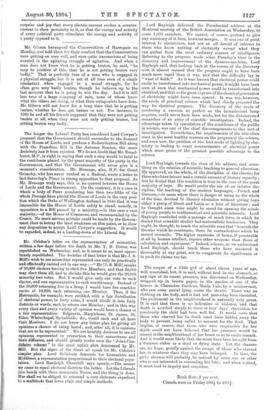Lord Rayleigh, towards the close of his address, said some-
thing on the relation of scientific teaching to general education. He approved, on the whole, of the discipline of the classics for those who have leisure and a certain amount of literary capacity ; but he denied that this condition is true in the case of the great majority of boys. He would prefer the use of an inferior dis- cipline, the teaching of the modern languages,—French and German,—in cases where there is danger of using up the whole of the time devoted to literary education without giving boys either a grasp of Greek and Latin or a love of literature ; and he thought some time might be saved for opening the minds of young people to mathematical and scientific interests. Lord Rayleigh concluded with a passage of much force, in which he denied that scientific studies had materialistic tendencies. They ought, he thought, to teach the scientific man that ".beneath the theories which he constructs, there lie contradictions which he cannot reconcile. The higher mysteries of being, if penetrable at all by human intellect, require other weapons than those of calculation and experiment." Indeed, science, as we understand Lord Rayleigh, should teach those who have mastered it thoroughly at any point, not to exaggerate its significance or to push its claims too far.


































 Previous page
Previous page